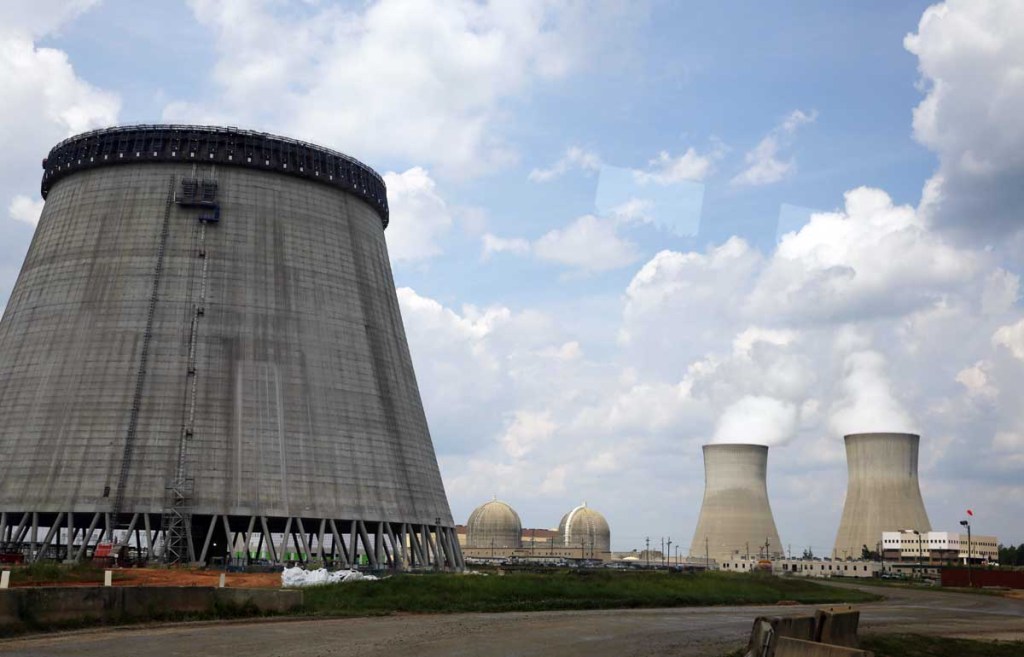Long embattled Dalton Utilities bill passes
Published 2:00 pm Wednesday, June 17, 2020

- In this Friday, June 13, 2014 photo, a new cooling tower for a nuclear power plant reactor that's under construction stands near the two operating reactors at Plant Vogtle power plant in Waynesboro, Ga. Southern Co. said the firms building its new nuclear power plant in Georgia estimate the project will be delayed 18 months, potentially costing the power company $720 million in new charges, company officials said Thursday, Jan. 29, 2015. (AP Photo/John Bazemore, File)
ATLANTA — Years of back-and-forth on a bill that would exempt Dalton Utilities from requiring a public referendum to borrow money for electrical projects came to a deciding vote Tuesday.
The measure passed narrowly — 91 representatives voted in favor and 75 against. A motion to reconsider on Wednesday failed.
Now on its way to the governor’s desk, the bill will remove restrictions on municipal utilities that requires a referendum vote to approve a revenue bond requested by the company to cover electric project costs and was first proposed three years ago.
Critics have long been concerned the legislation would disenfranchise Dalton voters from making decisions that may affect their power rates — and allow the utility company to take on more than it can chew on top of debt already owed in the expansion of Plant Vogtle – a project that is years behind schedule. Dalton Utilities has a 1.6% stake in the nuclear power plant’s expansion.
The utility has gone to great length to move the bill forward under the Gold Dome, hiring six lobbyists, including House Speaker David Ralston’s son.
Kasey Carpenter, R-Dalton, who has long pushed for the legislative change, said Dalton is one of only three utilities in Georgia that has this requirement for electric projects. The utility company is not required to hold a voter referendum when borrowing for water or any other non-electric projects.
“This bill will allow my utility the financial flexibility it needs to compete for economic development projects,” he said on the floor Tuesday. “It will also allow my utility to react for such things as this COVID pandemic that we saw a substantial decrease in industries use of our utilities.”
Carpenter told the House Energy, Utilities and Telecommunications committee — which voted in favor of the bill in January — that Dalton has paid more than $200 million toward Vogtle out-of-pocket through the years, he said, and owes another $73 million during the next three years.
Carpenter also said on the floor that Dalton Utilities has a debt to equity ratio of 5%.
“It is a strong utility and all they’re asking is to be able to be flexible in case projects come along for them to make a decision in a timely manner,” he said. “… We asked to do this, not because we have projects in the pipeline, but because when they do come in the pipeline we could respond in a timely manner.”
But environmentalists, consumer advocates and lawmakers from both parities are not convinced.
The bill divided Dalton’s representatives — Rep. Jason Ridley, R-Chatsworth, has fought against the legislation and said it gives the city-run utility no oversight to draft a check for Plant Vogtle.
Ridley voted against the bill but did not speak in opposition on Tuesday.
“I’ve fought it and fought it and fought it,” he told CNHI. “But you can only do so much … people know who was fighting for them and that’s all that matters.”
Mark Woodall, legislative chair of the Sierra Club — an environmentalist group — said he was disappointed with the vote.
“Dalton Utilities is taking away democracy,” he said. “And that’s wrong.”
Multiple Democrats spoke against the bill Tuesday — arguing it takes away the right of Dalton residents to vote on the issue.
While the state is already in an uproar about voting rights, with protesters calling for changes to the election system, Rep. Karla Drenner, D-Avondale Estates, said this goes beyond inconveniences on Election Day.
“This bill is not about long lines, it’s not about working machines, it’s not about untrained poll workers,” she said. “This bill is about a government taking. It takes a right of a person’s vote away.”
Rep. Beth Moore, D-Peachtree Corners, was vocal about her opposition as a member of the House Energy, Utilities and Telecommunications committee and debated against the bill Tuesday.
“Quite ironic, isn’t it, that we would vote to take away someone’s right to vote,” she said.
Moore said there is no local consensus on the bill, pushing it in front of the General Assembly.
But Rep. Don Parsons, R-Marietta, the chair of the committee, said in the two times the measure has come in front of his committee and was voted out, no local elected official came to speak against the bill.
“There’s nothing wrong with this bill,” he said.
Carpenter chalked up Democrats opposition to “grandstanding” for votes — Moore’s district is not directly affected by the bill.
“I know my city, I know my voters and they are not against this bill,” he said. “This is about allowing my utility the flexibility to compete for large electrical projects. We’ve had a company come in for $12 million worth of transmission growth. We have to cash flow that out of pocket, and that’s unacceptable in this economic environment.”





